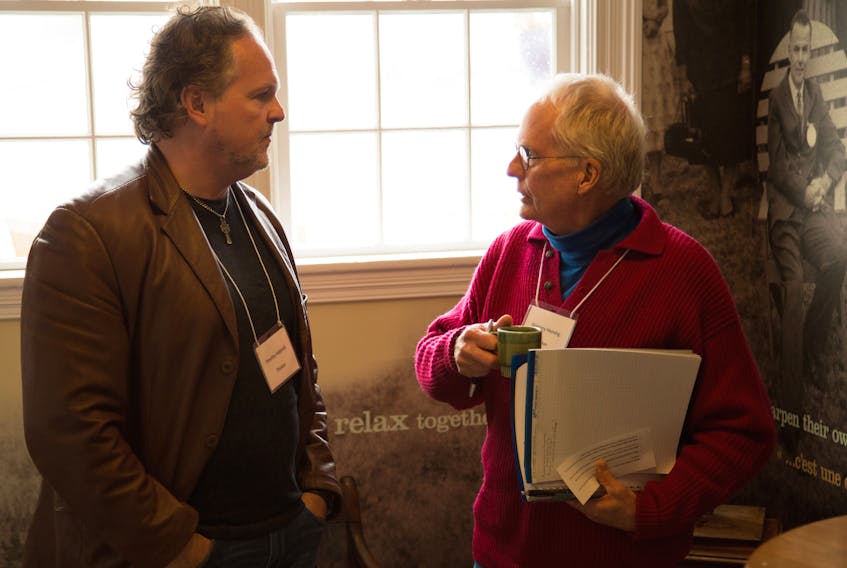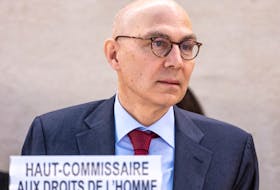ANNAPOLIS ROYAL - One of the organizers of the 2017 Pugwash Conference on Climate Change wants municipalities to invest in climate change solutions and believes asserting First Nations treaty rights would change perspectives and lead to new ideas.
Gregory Heming, with the Centre for Local Prosperity and an Annapolis County councilor, attended the retreat at the Thinkers Lodge in Pugwash Sept. 28 to Oct. 1. A 19-page report from the conference was released recently. Titled Climate Change and the Human Prospect, the report offers concrete actions that can be taken now and puts the onus on municipalities.
“For me the Thinkers Retreat acknowledges the fact that asserting First Nations treaty rights could be a game changer when it comes to finding local solutions to global warming,” said Heming. “These rights can effect change by facilitating ways around political barriers and proposing new ideas for ownership, power, capital and finance, while shifting consciousness and points of view.”
He said treaties are factual legal documents that hold environmental rights and land stewardship at the forefront.
“With a commonly shared acceptance of treaty rights, a foundation for a nation-to-nation collaboration can be established, assisting in powerful new ways towards GHG (greenhouse gas) emission reductions,” he said.
Original Retreat
“The original 1957 Thinkers’ Lodge Retreat is an important symbol of the Pugwash Movement, acting as a beacon for world peace and what can be done when you work together as one,” the report said. “Inspired by this original gathering and armed with a conviction that local action is not only possible, but the path forward, 24 global and regional Thinkers, representing all aspects of community life, gathered for two and a half days of intense, intentional conversation focused on actionable, locally-focused and forward-motion Climate Change plans.”
A focus of the conference was drawdown of GHG emissions, especially carbon dioxide.
“It is technologically possible for Canada to become a zero-carbon emission society. Right now,” the report contends. “The power of 50 Nova Scotia municipalities to achieve drawdown targets is significant. What stands in the way are political, financial and sociological barriers. The overarching mindset and cultural narrative needs to move from a ‘growth and extraction’ model to one that favours ecofriendly and financially viable solutions that can contribute to drawdown.”
The conference looked at setting community-scale drawdown goals, educating residents, creating energy/resiliency plans as the principal economic development strategy, and exploring and sharing out-of-the-box solutions such as Energize Bridgewater, Springhill Geothermal, and Summerside Smart Grid.
The report also talks about carbon sequestration through forest management that would pay woodlot owners for growing instead of cutting. Changing farming practices is also mentioned, as is sea level rise mitigation.
Municipalities
Heming believes municipalities can be leaders and that climate change mitigation can be economically stimulating.
“For me the Thinkers Retreat acknowledged the fact that if we want to reduce global warming and find local opportunities for businesses, for local job creation, we need to rethink our current local investment and financial models,” he said. “Municipalities need to move to more innovative and robust financial thinking and doing. Municipalities should be co-investors in global warming solutions. Municipalities can and must become the fuel for local economic resiliency while providing climate solutions. Community Development Invest Funds, municipal banking, and pension funds directed to local development are steps in the right direction.”
The report calls for carbon-credit forestry, high-value wood crafters co-ops, forest bio-waste for fuel to heat institutional buildings, use of organic mulches, use of green manures and cover crops, reduction in tillage, use of compost, and management of intensive grazing. It even calls for a return to the traditional hand-line fishing and trap-caught shrimp.
The report also wants municipalities to request that the provincial government and the Property Valuations Services Corporation alter the policy of providing reduced assessment rates for forestland so that clear-cut areas no longer qualify for the reduced rate and encourage woodlot owners to employ alternate cutting strategies and more active forest management plans.
The conference also urged municipalities to endorse electric vehicle technology and to install free charging point.
A Beginning
The report said the retreat was a beginning, a first step toward what they hope will be an ongoing and positive movement generating new ideas and innovations to help communities survive and thrive in the midst of changes to come.
“Having organized this Thinkers Lodge Climate Change Retreat, the Centre for Local Prosperity is examining possible next steps, which may include a Drawdown working group, and follow-on events such as further retreats, regional workshops, or larger public conferences,” the report concluded.
To view the report and see a video go to www.centreforlocalprosperity.ca.









